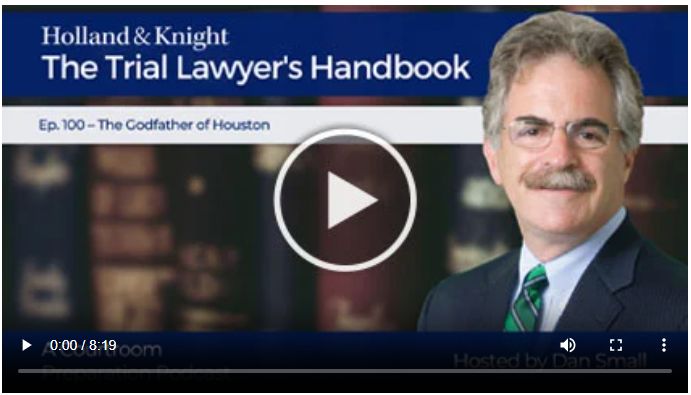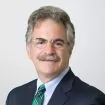- within Strategy topic(s)
In the 100th episode of "The Trial Lawyer's Handbook" podcast series, litigation attorney Dan Small introduces his listeners to Sam Cammarata, a career criminal who tried to follow his dreams and become the "Godfather of Houston." After brief stints in the Boston and New Orleans mafia, Cammarata decided to start his own criminal empire in Houston, Texas. With a nightclub as a legal front and a second-in-command with a love of violence, the Cammarata organization quickly grew more prominent and more profitable as it engaged in illegal activities such as bookmaking, loansharking, prostitution and extortion. As a prosecutor for the U.S. Department of Justice's Organized Crime Strike Force, Mr. Small was sent to Texas to help the Texas Rangers indict members of the criminal enterprise.
Listen to more episodes of The Trial Lawyer's Handbook here.
This podcast episode was adapted from Mr. Small's book Lessons Learned from a Life on Trial: Landmark Cases from a Veteran Litigator and What They Can Teach Trial Lawyers.
Dan Small: Sam Cammarata was originally from Boston. The rumor was that he had been a cop at some point, but I don't remember if we were ever able to confirm that. He had ties to the tightly organized Boston mafia, but not strong enough to advance him as fast as he wanted. So he set off in search of fame and fortune in the criminal world.
He spent some time in Louisiana working for New Orleans godfather Carlos Marcello. But that tight-knit organization was also hard for an outsider to move up in. So Sam moved on and ended up in Houston, Texas, which turned out to be the city of his dreams. Here was a booming metropolis without any real pre-existing organized crime structure. Sam set out to become the godfather of Houston, and he came pretty close. Sam recruited various other criminals to join his organization. Most notably, Tommy Teustch, a cunning but very violent criminal. Tommy always carried two guns and bragged about using them. He swore he'd kill anyone who came after him. His love of the good life, money and killing set the tone for the Cammarata organization.
Early on, Sam took over a nightclub, which provided him three key things. First, it was a good cover: Sam's family and neighbors believed, or maybe they wanted to believe, that Sam was a legitimate business owner. Second, it provided a base of operations where people could easily come and go, meet and plan. Third, it was an easy way to launder some of the illegal profits. Who knows whether a cash bar sells $100 worth of drinks in one evening or $1,000? And who knows how many people actually pay for admission with cash?
From the nightclub, Sam built an empire of traditional criminal activity: bookmaking, loan sharking, prostitution, extortion and more. Thanks to Tommy's involvement, a particularly violent aspect, the organization grew and its profits grew. Sam was on his way to achieving his goal: Godfather of Houston. All this behind a front of legitimacy.
Sam did spend time managing the nightclub and various musical acts. He also encouraged other members of his organization to get involved in legitimate businesses and community activities: church, school, social, whatever. It was quite a contrast. For example, his right-hand man Tommy bought a bowling alley. What a strange disconnect: a professional criminal and killer entertaining parents, children, working people with bowling. By the way, it happened to be another good way to launder illegal cash — bowling shoes, anyone? But it was a real business.
Fast forward to when we indicted the organization. As a prosecutor with the U.S. Department of Justice's Organized Crime Strike Force in Washington, D.C., I went down to work with the great Texas Assistant U.S. Attorney, Wayne Speck, to indict 13 people with racketeering and other crimes. The Texas Rangers and other cooperating agencies coordinated sending teams across Texas to arrest all of the defendants quickly before news of the indictment got out and they got away. However, there were only a few of us prosecutors, and we spent that day racing from one courthouse to another to attend bail hearings, trying to keep the defendants in jail.
But Tommy was prepared. In Florida, they talk about being prepared for hurricanes with an emergency hurricane kit. Tommy had an emergency arrest kit. While I was racing across the state, trying to get in front of the local magistrate holding his bail hearing, Tommy's lawyer got there first and argued that Tommy was not a danger or a flight risk. He had deep roots in the community, a certificate as a church deacon, family photos, the deed to his bowling alley ready to put up as security. The local magistrate was convinced and let him go before I could get there to argue the other side.
In an instant, Tommy was gone, off to Costa Rica. He stayed there for several years, but his love of the high life — the clubs, the women, the parties, the drugs — was so strong that he kept coming back to Texas for a few days at a time. Although we were in federal court, in part to make use of the federal RICO Act — Racketeer Influenced and Corrupt Organizations — the case was largely investigated by the Texas Rangers. The Rangers put out a substantial reward for information leading to Tommy's capture and pressured their informants to provide details. But everything is a balance. Their informants' fear of Tommy outweighed the temptation of the reward. So the Rangers would get calls like:
"Tommy was here!"
"When?"
"Yesterday!"
"Where is he now?"
"Don't know!"
"Why didn't you call yesterday?"
"Um, couldn't get to a phone?"
The Rangers would call in a SWAT team — since Tommy was always heavily armed and had sworn never to be taken alive — to see if he was still where the informant claimed to have seen him. Of course, he never was. Back to Costa Rica.
Tommy being on the loose, combined with his vow never to be taken alive and to exact vengeance on his enemies, led the Rangers to instruct me to always travel with them in a group and always carry a gun when I was in Texas. We finally got word, years later, that this pillar of the community had died in Mexico where he had gone for back surgery.
The veneer of legitimacy went beyond business. It included family. Sam kept to the traditional mafia practice of keeping family and business separate. His family went with him to church and community events and heard only about his legitimate business activities. Sam's indictment on racketeering and murder charges was a shock to many people, including his family. He told them it wasn't fair, it was all lies, and he was being persecuted. Having heard nothing else, they believed him.
When the trial started, his wife was there, sitting right behind him in the front row. Sam's lawyer in his opening statement made a show of pointing her out and talking about her support. She would be there for the whole trial, he promised. But our beliefs, even those we hold so dear, are rarely confronted with a tidal wave of sworn testimony and other evidence. Hour after hour, day after day, his wife had to listen to compelling evidence that the husband she thought was a legitimate businessman, a gracious host and a devoted family man was, in fact, the head of a violent criminal organization. By the fourth day of this month-long trial, she was gone, never to return. The veneer of legitimacy was pushed aside. The godfather of Houston was convicted of RICO and went to jail.
The content of this article is intended to provide a general guide to the subject matter. Specialist advice should be sought about your specific circumstances.
[View Source]

